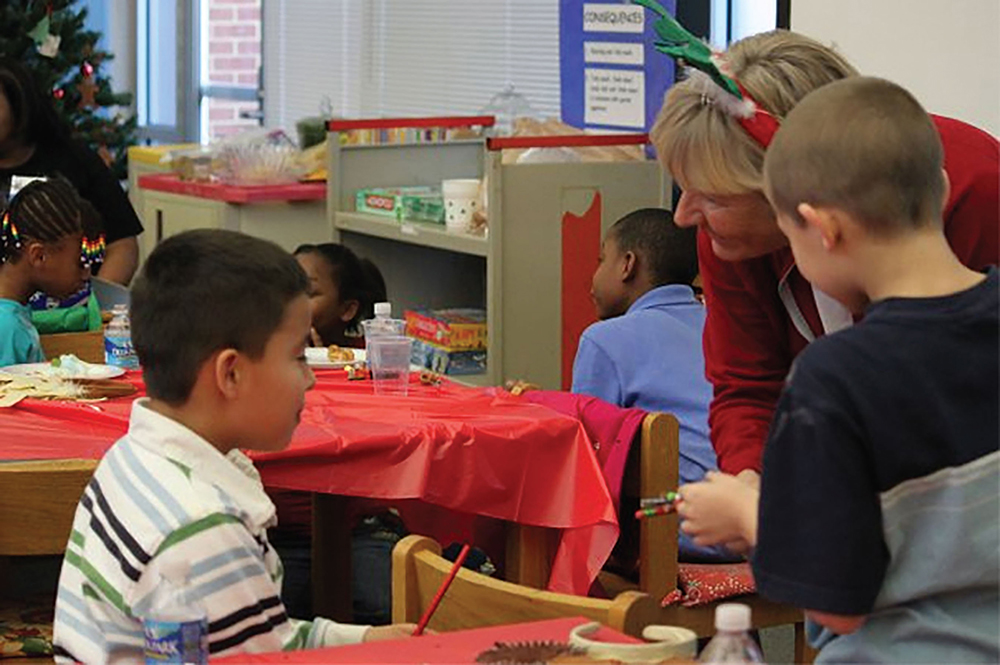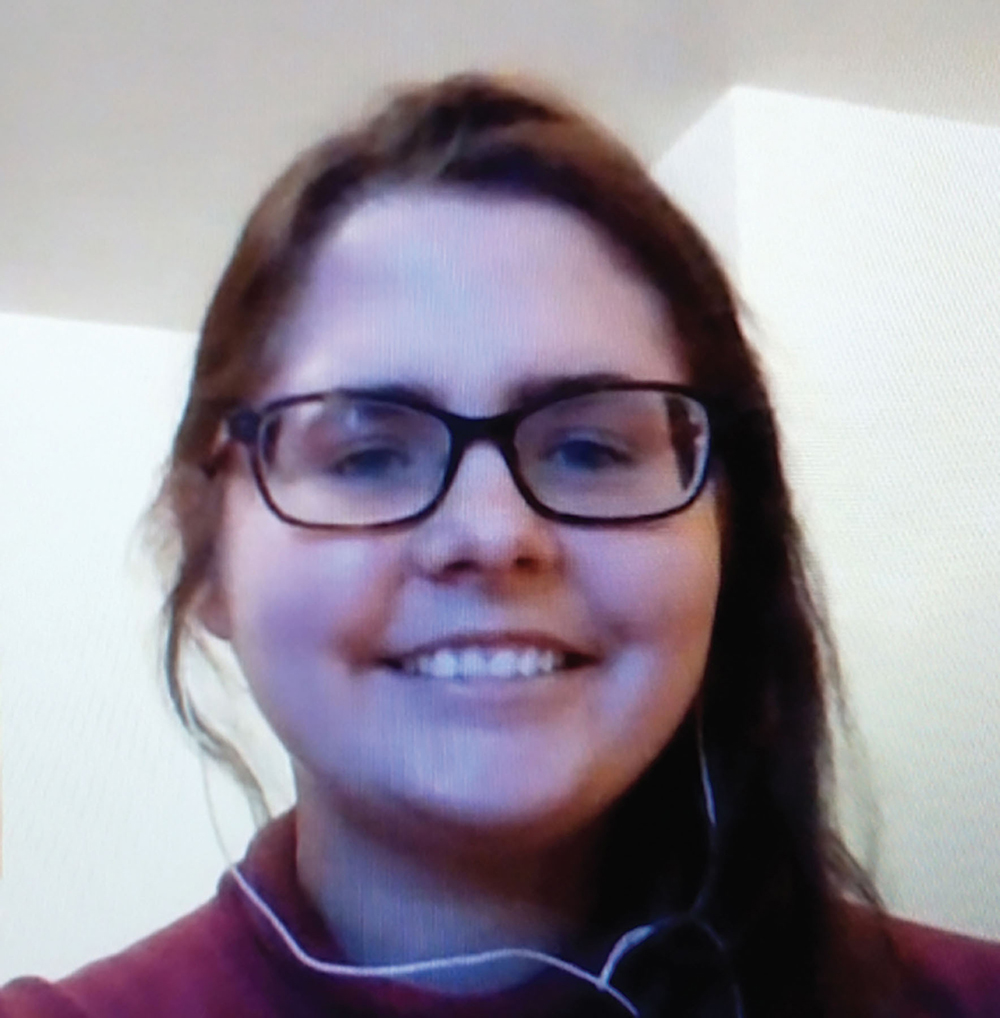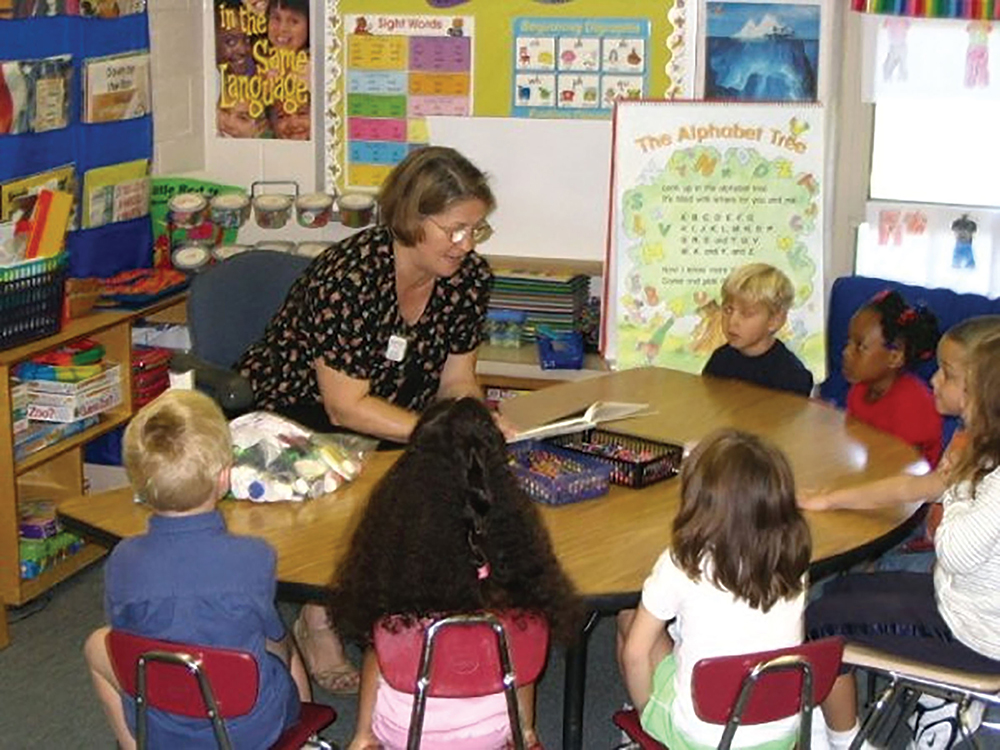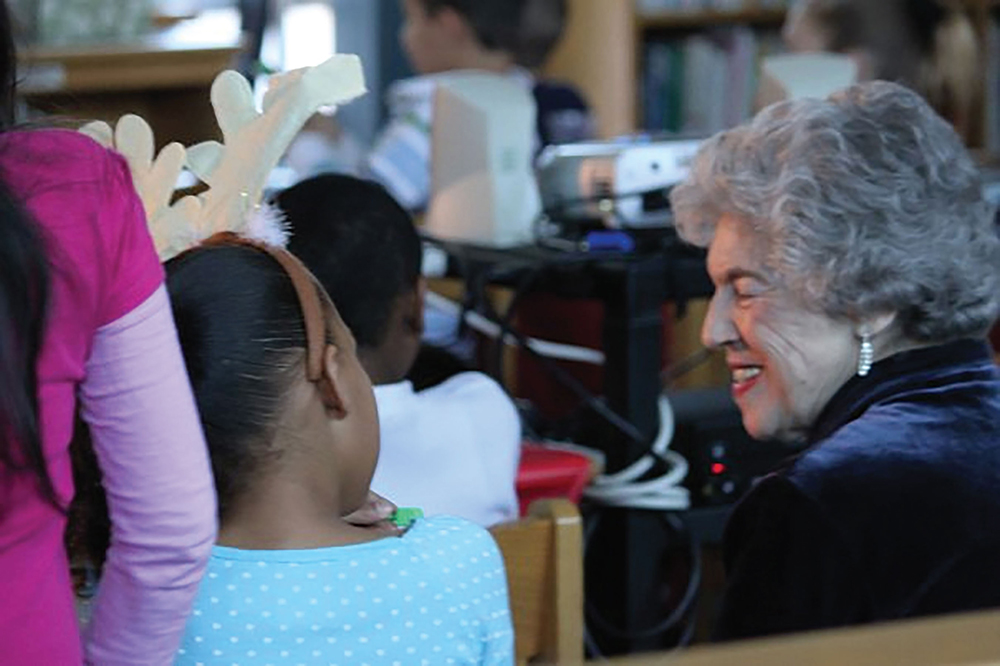A Different Kind of FISH

A volunteer engages with students during a holiday party prior to the pandemic (photo courtesy of JABA).
By Linda Salisbury
If there are success stories to be found during the pandemic, adult mentors and students in a program called FISH have a great one to share.
JABA (Jefferson Area Board for Aging) was founded in 1975. It provides information and support for seniors, adults with disabilities, and their families throughout Central Virginia.
Friends in Schools Helping (FISH) was established in 2004 by JABA, which also provides primarily adult services in that region.
Based in Charlottesville, the intergenerational FISH program has offered a conventional mentoring program since its inception. Adult volunteers were matched with students preschool to high school, with most placements in elementary schools. Pre-pandemic, they met in school classrooms, usually once a week. The hour-long mentoring sessions are more about helping youngsters with a variety of skills – such as guiding students in the learning process, working on homework, or getting assignments in on time – than teaching a course. And the mentoring is free, which makes it accessible to those unable to afford the cost of $20 to $70 an hour for private tutoring.
Then came the Coronavirus pandemic in the spring of 2020, and with it, the temporary end to the in-person mentoring at schools. FISH immediately needed to revamp its program for the safety of volunteers – many of whom have underlying health issues – and also students and their families. That meant converting in-person visits to virtual ones. FISH personnel were concerned how students, often involved with virtual learning all day, would take to another online experience.

Pictured via Zoom is Winter Broadhurst, volunteer services coordinator for the Jefferson Area Board for Aging (photo by Linda Salisbury).
What is common to mentors and students during the pandemic is the feeling of isolation. Winter Broadhurst, volunteer services coordinator for JABA, wondered how Zoom FISH sessions would work out, both technically and socially, for all involved. She said, “I was surprised how quickly mentors were able to make the connection with students, which was much swifter than with in-person monitoring. The program has worked out very well.
A win-win.”
At present, there are about 25 mentors, including one as far away as Texas. Because the program is virtual, no longer do mentors need to live in a certain school district or state, Broadhurst explained.
many mentors are former teachers or professionals, such as psychologists, graduate students, or those in nursing studies
The volunteers are required to be interviewed, provide references, have a background check, and undergo three hours of training. Part of the training includes learning how to teach with Zoom and what resources are available through the program and schools. There is at least one student in each of the areas JABA serves: the city of Charlottesville and the counties of Albemarle, Louisa, Nelson, Greene, and Fluvanna.
Broadhurst said that many mentors are former teachers or professionals, such as psychologists, graduate students, or those in nursing studies. “It’s a good mix of different backgrounds,” she explained.
Virginia “Ginny” Tunis has been mentoring for three years, the first two in classrooms and the third as a Read Aloud volunteer. She brings her own diverse background to mentoring, with master’s degrees and career experience in both education and social work, and work. In retirement, Tunis looked for volunteer opportunities and found the
FISH program.
While mentoring at Broadus Wood Elementary School in Earlysville just north of Charlottesville, Tunis was asked by a teacher to listen to several students individually read aloud in 15 minute sessions. Tunis said she wondered how that short period of time could be worthwhile. During a Zoom interview, the teacher assured Tunis that the one-on-one experience was worth more than gold.
When the pandemic forced many schools to switch to virtual learning, Tunis said that “my heart wasn’t in” that type of experience, particularly as so many students were forced to be online most of the day. Then Broadhurst suggested that she and others try a Read Aloud program.
Tunis selects a book that appeals primarily to children ages three to six. She records herself reading ten-minute segments that, at this point, are mostly on the FISH section of the JABA Facebook page at www.facebook.com/jabafish.
Then there’s the teddy bear perched on her chair as she reads. Tunis was looking for a way to “lighten up” the visual experience for the students and adults listening to her read. She ordered the brown bear online and named it Jelly-Belly the Bear. Jelly-Belly has become a familiar, friendly, and attentive listener.
Other volunteers are also finding ways to have positive mentoring experiences during the pandemic, according to comments posted by JABA. Laura Vik wrote that, “If I were to use one word to describe my experience as a FISH volunteer, I would use connection. During these surreal Covid times, being able to read with my student, seeing the effort she gives, makes the experience invaluable. I’m not sure who benefits more.”
Another mentor, Ron Brownfield, is quoted describing the focus of his 45 minute mentoring sessions each week. At the mother’s request, Brownfield was asked to help prepare the child for the future. Brownfield suggested that the student interview his parents about their jobs. Also, he and his student learned to play chess together.
Mentor Dona Eastman wrote about her fun experience working online with a girl who loved to draw and read. The child suggested books, many with a unicorn theme, to read for the next session. “She taught me some words in Vietnamese; gum is rice,” Eastman explained. “We laugh at that one. This [is] such a good program. Several times we have gone over the hour limit, but until Zoom cuts us off, we just keep going.”
JABA notes that FISH volunteers may also be part of their “Enrichment Activity Mentors” program, which gives volunteers the opportunity to demonstrate their skills or hobbies over Zoom.
Most youngsters are referred to the program by schools, but parents can also request them. Some mentors have stayed with their students for many years, following them from grade to grade. With Zoom mentoring, volunteers are also able to stay with a child if they move into a different school district. The Zoom program has also enabled FISH to pair students with volunteers who speak the language of their homes to help them improve English skills or understanding.


The diversity of volunteers is a real benefit to students living in rural areas. Broadhurst said that among her volunteers are those who speak Spanish, an Arabic language, and German, for example. These mentors with special skills can help students living outside their own geographic areas.
Parents must agree to watch a short video that describes the role of the mentor. Mentors may be helping academically or assisting with personal growth for each student. Part of the training for volunteers includes learning how to understand the technical aspects of Zoom.
Mentors often form a relationship with those raising the children – parents, grandparents, guardians or others – and help them find resources they need in the school or community.
Although many students are eager to participate, some who need the mentoring are a little reluctant to get involved, said Broadhurst. Parents may have to tell them that “this is what you are going to do” to learn how to get assignments in on time, for example. “Once they get going, they are really into it and become excited to be there,” she emphasized. Some families are involved with the sessions, or occasionally siblings join the session together.
Not all parents or teachers feel comfortable using Zoom because of the technology involved, so the program can help with “personal growth mentoring” phone calls.
JABA explains on its application page, “Academic mentoring will be limited, but personal growth mentoring from FISH volunteers is possible. Conversations might center around dealing with emotions and demonstrating care. These volunteers will be trained on the personal growth mentoring portion of the PowerPoint and given conversation starters to encourage communication. This will support students in verbal language skills, socialization, emotional wellness, and phone etiquette.”
Confidentiality is essential to the program, both for families and mentors if they choose. Volunteers must sign a confidentiality agreement, and parents must sign an agreement to participate.
FISH stays in touch with families, youngsters, and mentors throughout the year. Mentors are paired with a “buddy” to give them support. A newsletter is sent out, and FISH is organizing a virtual coffee house for mentors to get to know each other. Mentors can bring coffee and a snack to the “coffee house,” but Broadhurst said she will have hot cocoa for herself!
Broadhurst has been the head of volunteers for a year and a half, having moved from Florida to Charlottesville to run the program. Her background is in adult education and tutoring, and Broadhurst said that she “loves training people.” Now, using her skills and imagination, Broadhurst is finding new ways for FISH volunteers and students to continue to connect in ways that benefit all involved.
To volunteer as a mentor, call 434-817-5226, visit hwww.jabacares.org/fish, www.facebook.com/jabafish, or email info@jabacares.org.
Articles

RuraLove Ministries
This truck is filled with donations, some that have been picked and some to be delivered (submitted photo).by Kate Seltzer Four years before she could retire, Coral Losinski knew that she wanted to spend her retirement working at RuraLove’s thrift store. She...

Tracking Lake Anna’s History County by County
Montpelier, located in Orange County, is the family home of James and Dolley Madison. Madison was the fourth president of the United States and the third to hail from Virginia. The home is open for tours on Saturdays and Sundays with more information available on...

